Lachlan Murdoch on the power of free thinking
In an exclusive interview, News Corporation chairman Lachlan Murdoch speaks passionately about freedom of the press and its value to democracy in a troubled world, and tells of his love for Australia, ‘a country of great opportunity’.
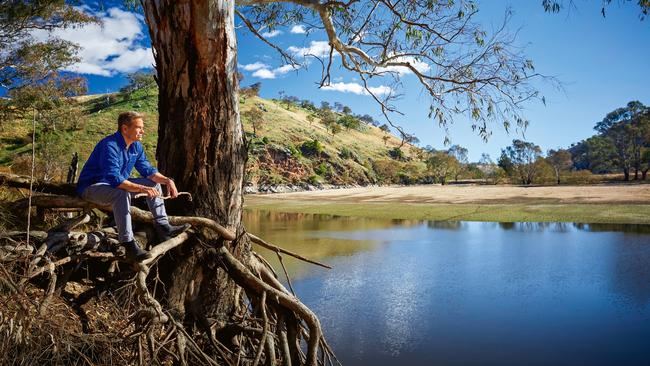
It has been a long-awaited transition – the formal transfer of power from father to son. Lachlan Murdoch, 52, now presides as the sole chairman of News Corporation, in a world of unparalleled media dynamism and upheaval.
Murdoch is his father’s son, the beneficiary of Rupert’s lifelong media accumulation, yet a business leader deeply aware he assumes power in an age transformed from that mastered by his father.
The younger Murdoch’s destiny is to navigate continuity with change – a challenge highlighted by this month’s 60th anniversary of The Australian newspaper, a publication founded by his father but long wired into Lachlan’s life in a way few outsiders realise.
The most fascinating aspect of the Lachlan Murdoch story is the journey of his heart. His fidelity has been to the company’s Australian identity, and he has made his life in Sydney. It is, in many ways, an extraordinary decision. Rupert was an Australian who discovered the world; Lachlan has been a cosmopolitan who discovered Australia.
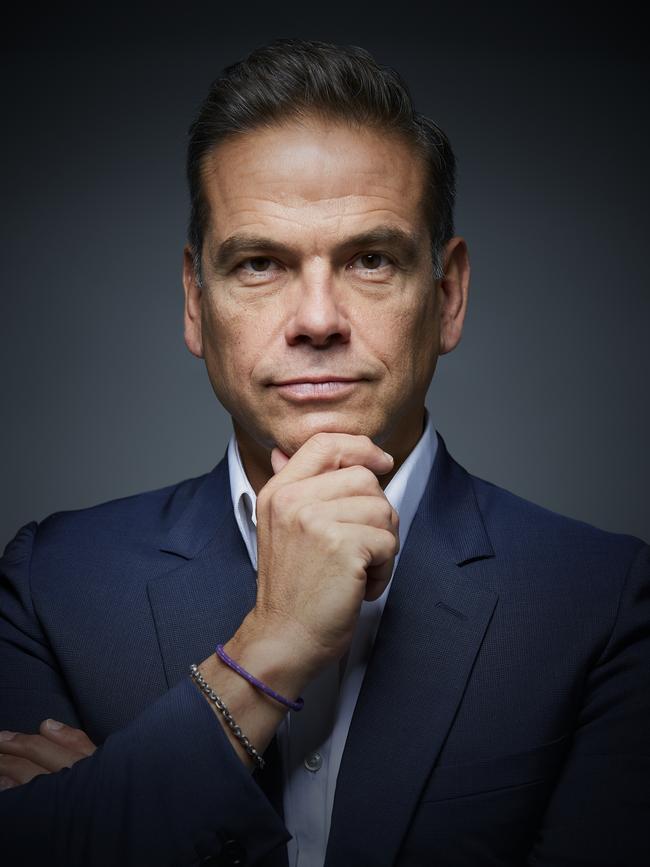
In a long and revealing interview in Sydney to mark The Australian’s 60th anniversary, Lachlan discusses his ties to Australia, how newspapers got into his blood, the challenges coming from Big Tech and AI, the current tribulations of the United States, and how he intends to lead News Corporation in a world where democracy looks vulnerable and strategic dangers abound.
His central message for the future of the media business is about journalism. In a landscape compromised by social media and awaiting the impact of AI, Murdoch said: “Everything comes down to the journalism, to the quality of reporting, the opinion, the analysis, breaking news and understanding our audiences.” Regulators and governments everywhere need to grasp the dangers to our society and the threats to journalism from Big Tech because “if they don’t, you really run the risk of journalism being significantly degraded”.
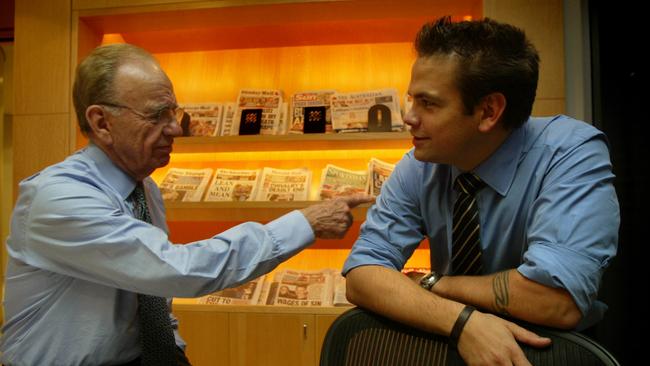
Murdoch assumes the top job aware of a world gripped by multiple crises, having recently visited both Ukraine and Israel. His vision is for News Corporation to provide leadership – in the industry and the wider community. “We are really set apart as a company,” he said. “Our company has a unique voice that no one else has. There are a number of people that say The Wall Street Journal and The Australian are providing this voice and that, if it wasn’t for us, that voice would not be available and would not exist in the political and cultural debates that are of critical importance to our communities and societies.
“I believe that if it wasn’t for The Australian today, if the policy debate in Australia today was being driven by the ABC, then we would be a totally different country.”
As chief executive in a world with democracy under challenge and strategic dangers erupting, Murdoch said the role of News Corporation and papers such as The Australian was to be “fully engaged as a company, investing and supporting journalism, respecting our readers and confronting the issues”. He said: “I think our role is essential both here in Australia but also in Britain and the United States. This is absolutely how I see my leadership mission. It’s also our responsibility as a company and I feel that very strongly.”
How often does he talk to his father? “It’s most days,” he said. “Sometimes only for a minute or two to check in. When we’re in the same city, we spend more time together.” The point is apparent: Murdoch will pursue the overall vision of his father, but adapted for a more turbulent industry and world.
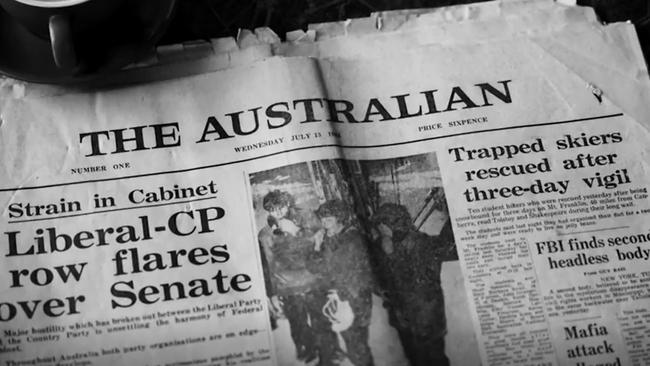
How does Murdoch feel about The Australian at its 60th anniversary? “It represents how I feel personally,” he said. “It reflects a sense of optimism for this country and for the debate in this country, the direction we aspire for the country. The paper is concerned about how Australia can fulfill its full potential as a nation. My focus is the future of the paper, the importance of the paper, and our role in democracy.”
The point to grasp about The Australian is that Rupert Murdoch, having purchased many papers, didn’t buy this paper. He created the paper. More than just about any product in the vast News Corporation stable, The Australian is family business. Lachlan’s commitment to The Australian runs parallel with his commitment to the country.
Born in London, educated in the US, Lachlan said: “I’m Australian. That’s how I see myself. My family’s Australian. Obviously Sarah, my wife, is Australian. My kids are all Australian. Sydney is home to us.”
He lives an astonishing and demanding life: “I spend as much time working overseas as I do here, but Australia is certainly home.”
The iconic symbol of Lachlan’s ties to Australia, its spirit and its landscape is his attachment to the Cavan property outside Canberra, purchased by Rupert in the 1960s and the location, over the decades, of many events – private, business and political.
“It’s always had a special place in my heart,” Lachlan said. “There’s the connection to the Australian bush, the rugged hills, the limestone outcropping and the Murrumbidgee River flowing through it. When you’re there, you can sense the Australian character.
“I have incredible memories of Cavan from my early days, growing up as a young child. And Sarah and I decided to get married there. We built a temporary chapel, down on the banks of the river. When you looked out from behind the altar, the view was fantastic, the winding river, its sandy banks, framed by the big river gums.
“It was in March and it usually doesn’t rain in March. But it poured with rain that day.”
The rain didn’t matter. What mattered was the location – not New York, not Los Angeles. It was a statement of the heart. Lachlan and Sarah had their 20th anniversary there five years ago. “It’s a unique place, not just for me but for Sarah and my children,” he said.
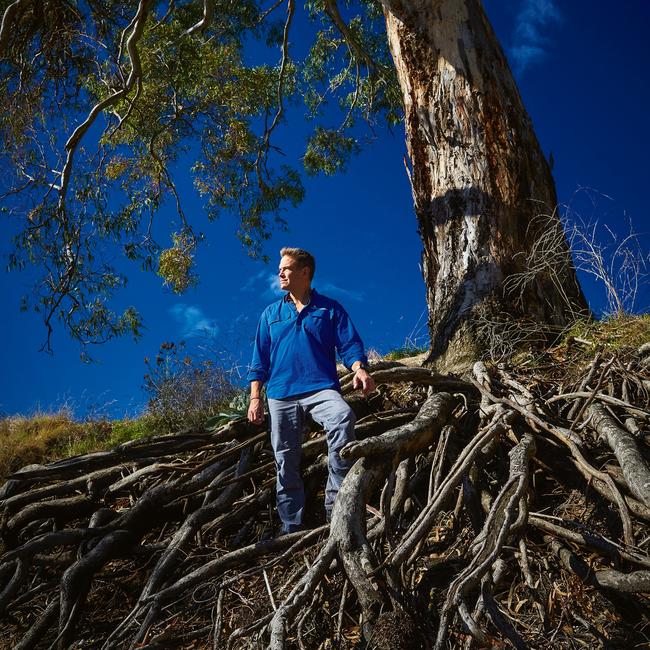
Murdoch doesn’t just reside in Australia. He seeks to renew the origins of News Corporation as an Australian company inherited by Rupert as a small, Adelaide-based media operation when his father – Lachlan’s grandfather – Sir Keith Murdoch died in 1952.
In late May, at Lachlan’s initiative, the company’s annual budget meetings were held in Sydney with about 60 executives and editors from around the world – many of whom had never set foot in Australia – coming for a series of business and dinner sessions.
Asked from his vantage point as executive chair and CEO of Fox Corporation, and chair of News Corporation, to describe the company’s roots, Murdoch said they were still “a thousand per cent” Australian. He said “our DNA originates in Australia” and that remains the situation “even today”. His life choices – facing the difficulty of running an international corporation from Sydney half the time – testify to a personal commitment.
From the time he began visiting Australia as a young man, Murdoch felt an affinity with the culture, the physical landscape and the print business. But there was always a purpose – he was absorbing, from the ground up, every aspect of this astonishing 20th century industry. The upshot, realised by few people, is that Lachlan Murdoch has had an involvement with The Australian for several decades.
“I must have been in my mid-teens, 14 or 15 years old,” he said. “I had a summer job because in America you have these long summer holidays and on one of them I was sent to Sydney. I had a job cleaning the presses. I was learning the trade, here in Holt Street, when we still had the presses down in the basement. That was a great romantic time in newspapers. You’d know whether editorial had gotten off the stone on time, then the presses would rumble into action. You could feel it through the whole building, you’d check your watch, are we on time or not?
“Working on those presses was a great experience for me. I learnt a lot about the fundamentals of the business and knew the people who got the paper out every night.”
Murdoch’s office today is on the fifth floor. The Australian editorial department is on the second floor. The basement is now the car park, the presses having long since moved out of the building. Murdoch said: “One of the great things today, when I drive into the building, the floor of that basement, that’s all the metal tiling, you can still see if you look in that floor, the metal, the steel cutouts and the press footings.
“We had a very old R. Hoe printing press, one of the older presses we had, that was our poster press, like the entry-level press I was allowed to play around and work on, printing posters for the newsagents.
“I think I might be one of the last people – probably the last person still in this building – who actually worked on the reel-room printing presses.”
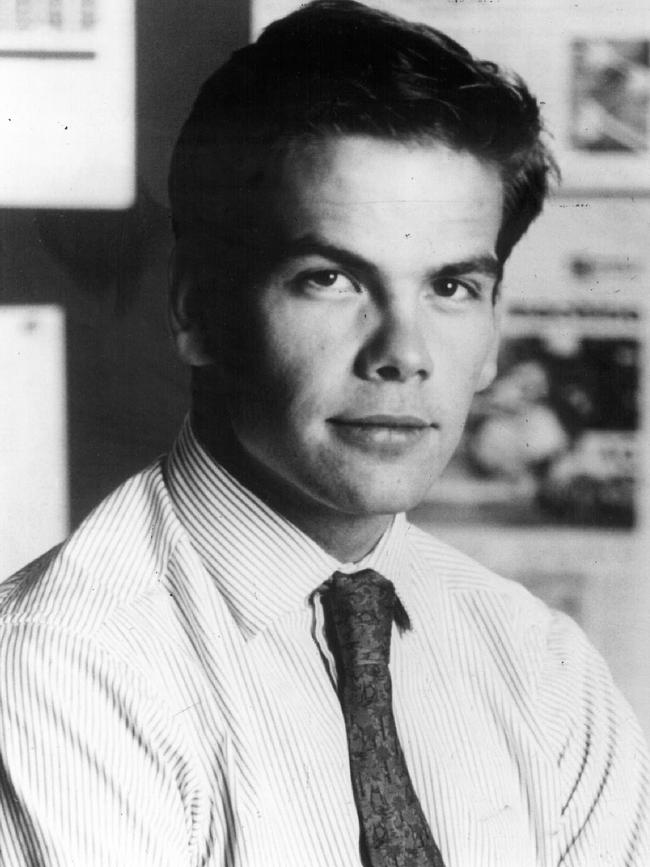
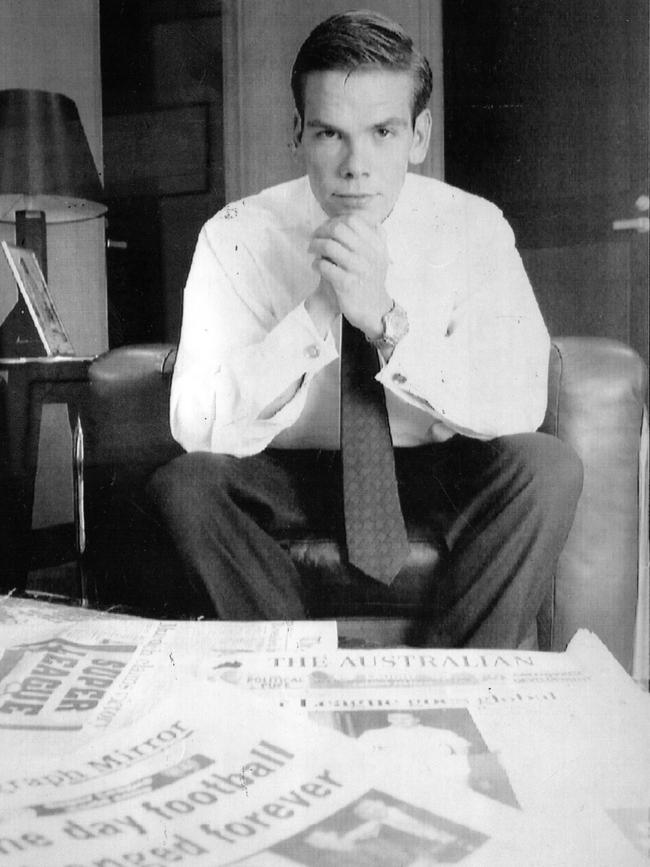
In the 1990s, as a young executive, Murdoch worked in Brisbane as general manager of Queensland Press overseeing The Courier-Mail then moved to Sydney as publisher of The Australian.
The author was, at that time, the Editor-in-Chief, and had a daily meeting with Lachlan. “When I do the math, I was involved around ’94 and ’95, so I’ve probably been involved for half the history of the paper,” he said.
At the 50th anniversary, Rupert Murdoch told the author he regarded The Australian as “one of my main lifetime achievements”.
Rupert revealed that creating a national newspaper had been “my father’s dream” and that Keith Murdoch “talked to me about this when I was a teenager”.
Lachlan now stands in the third generation of this newspaper business, and the notion of a national paper. The first edition was published on Wednesday, July 15, 1964, based in Canberra with a cover price of sixpence.
“We are not tied to a party,” Rupert said. “We are not a party newspaper.”
From the start, Rupert’s purpose was to shake up the country. The mission was to act as a change agent – and Lachlan affirms this remains the mission.
He believes in The Australian as a vehicle covering the nation but engaged with the world. Under Editor-in-Chief Michelle Gunn, the first woman in that role in the paper’s history, The Australian has spearheaded recent national debates over the economy, the voice referendum, national security, immigration, industrial relations, technology, energy and climate, productivity and education – being ready to ventilate both sides of these issues, but also to take a stand.
Murdoch is ambitious for Australia, but sees plenty of scope for national improvement. He wants Australia to do better for itself: “My view as a proud Australian is that we are a country of great opportunity but not without problems, obviously. We are confronting those problems, how we deal with inequalities, how we deal with anti-Semitism, how we deal with challenges to some of our institutions – but these are the issues that face a lot of Western nations.”
Australia has always been in his life. In the 1970s and 1980s living in the US, graduating from Princeton, Lachlan was in a special position to see the company’s rapid expansion. The revenues became US-driven.
“We always had great journalists and editors coming through. And we relied upon pulling Australians for talent and putting them into positions of importance around the world. There was always the Australian link. We grew up, even though we’re in America, with Australians around us all the time.
“We’d come back to Australia at Christmas to see Dame Elisabeth (Lachlan’s grandmother) at Cruden Farm. We had that sense we were expat Australians living overseas. I felt that strong bond to Australia. But it was only really when I moved to Australia in my early 20s, when I was 21 or 22, it all clicked. I understood what I had felt, that closeness to Australia was part of my whole upbringing. I understood why I felt that way.
“I think family history – and, first of all, I should say family – is certainly important to me. It’s something I care very deeply about. As I try to live my life in journalism and around the contest of ideas, the history of my grandfather is obvious, being a journalist and an editor. And then, of course, my father who’s got ink running in his veins and has been such an incredible publisher and proprietor of news organisations. I feel that history. It has informed a lot of decisions in my life and business.”
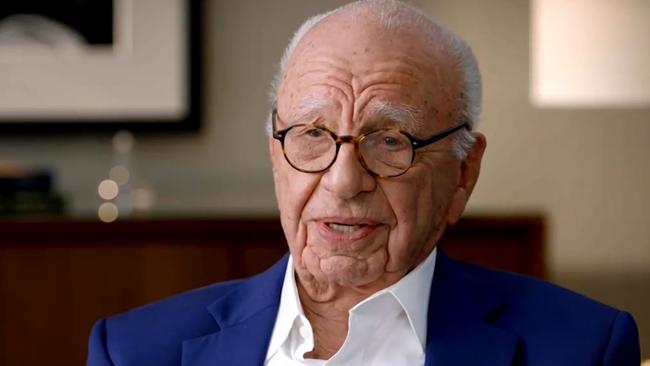
He is in a special position to compare and contrast Australia and the US. Murdoch sees Australia “for better or worse, tracking behind America by several years” – in part, a function of the internet and social media. But Australia has a “great benefit” compared to the US: “We are politically more centrist, less driven by extremes on the right or left. That’s a real benefit. It’s an Australian advantage but an advantage we have to protect, not something we can take for granted.”
He worries about Australian under-performance. “I don’t think it’s a Liberal or Labor issue,” he said. “I think successive governments, whether Labor or Liberal, have underperformed on their promise. We have avoided taking some of the hard decisions we need as a country and that’s under both sides of politics.”
He sees the past 20 years as a more troubling time for Western democracies, including Australia. In Australia, the Hawke-Keating years were “reforming governments” followed by Howard and Costello, also reformers. Since then, we’ve lacked “the will to really sort things, reform and drive productivity”.
Confronted by a likely contest between Joe Biden and Donald Trump for the US presidency, Murdoch is dismayed: “Unfortunately, this year we haven’t had a robust primary challenge on either side. So you almost have two incumbents because Trump is running effectively as an incumbent. He’s been a president for four years. He has the name recognition of an incumbent. So, in effect, you have two incumbents competing against each other.
“I think both sides of American politics have been divisive. A lot of public commentary has been around Trump being a divisive figure. But I think the Democrats are being as divisive, and that Biden has been a divisive president. We need to find leadership that can bring the country back together.”
Asked about the geo-strategic future, Murdoch said: “We’re in it, now. This is the most dangerous environment since the 1930s. There’s no avoiding that. The risks are not isolated to any one region. It’s in Europe with the war in Ukraine and the aggression of Russia under Putin. It’s in the Middle East, what we’re seeing in one lens in Gaza but really driven by Iran. Obviously it’s in Asia with the growing confidence and aggressiveness of China.
“America’s recent aid package to Ukraine was important, that was close. It almost didn’t get through the Congress. Any failure on Ukraine would have emboldened China on Taiwan. We need to make it as hard for China as possible – not just from a kinetic point of view in terms of what could happen with Taiwan, but it’s how China is acting, in diplomacy, in economics, through its information-gathering and cyber warfare. We are in a multi-polar risk environment, which will take a level of wisdom by political leaders and policy makers on a global basis to get us through. It’s not going to be easy. I wish I could say something more positive.”
He is emphatic and unqualified on the need for US leadership: “America withdrawing from the world, if that’s the path it goes down, sets up a tremendously dangerous situation. When you withdraw – the disastrous withdrawal from Afghanistan, for instance – bad actors move in. If you create a power vacuum in parts of the world, bad actors just move in. It could be China, Iran or it could be Russia.
“We’ve had 50 years of relative peace and we understand what led to that peace – it was American leadership. It’s a more dangerous world without America being engaged. As a company, we need to talk about that. Whether it’s in The Australian or other publications, we need to be having these debates and confronting the issues, particularly in Australia, because they’re going to affect us and our children.”
He wants an outward-looking Australia – another central theme from his father, and fundamental to the outlook of The Australian over 60 years. “I believe we have to engage,” he said. While Australia is not a great power, “there is an outsized respect for Australia in the world in terms of our governance and leadership”.
Despite his attachment to the company, Murdoch walked away in 2005, aged 33, in a dramatic exit after a series of traumas, launching his own private investment company amid media speculation his chance to succeed his father was virtually lost.
Asked about this decision with its personal as well as corporate significance, Murdoch said: “It was one of the best decisions I ever made. I learnt a tremendous amount. When I left I worked incredibly hard for almost 10 years, building my own business, which was very successful. It was a really important part of my growth. When I came back it was with a history of actually having the confidence, having built that business.”
While he didn’t say as much, the sense is that Lachlan proved himself. Clearly, the experience was decisive.
Assessing the future of the industry, Murdoch sees it poised between threat and opportunity. His strategy is to commit to journalism but be adaptable about the delivery mechanism. He said content must be valued and monetised. Big Tech and social media didn’t value journalism and were still unbalanced and irresponsible about their community and social obligations.
He said News Corporation had a leadership role to play – in terms of the quality of its journalism and its campaigns to ensure tech companies were obliged to pay for journalistic content.
“Social media companies – and the big digital platforms – have to value journalism, value news as an essential part of our communities,” Murdoch said. “We need to hold them to account to do that. Regulators and governments also need to understand – and I think they do – the importance of journalism and independent news organisations in their jurisdictions. They need to help support those institutions, the mastheads, newspapers and journalists.
“Social media platforms don’t value journalism. They can sell it. They can monetise it. But they don’t put anything back into journalism. This is a very dangerous situation for democracies. If you take away the ability to invest in journalism because social media companies don’t value it, that affects our whole society and potentially in a very dangerous way. Those companies don’t value it unless they’re forced to and that’s something their customers, their users, and the regulators have to look at, because it’s fundamental to how our democratic system works.
“When people say that they get their news from X/Twitter or through TikTok or through Facebook, a lot of times it’s our journalism and our stories that they’re reading, linked to those social media sites. But, if we continue to get the journalism right, and we continue to get the investment and put our content in front of as wide an audience as possible, then we’ll continue to evolve and succeed.”
In addressing the challenge of Big Tech, Murdoch wanted to speak both as a media leader and as a father. “As a father you certainly understand the risks,” he said.
They come in two dimensions – the impact of social media on young people and the consequences for democracy. Bullying online, often through messaging groups, constituted a serious challenge. Given a 16 or 17-year-old girl might be on social media sites more than five hours daily, he said the question became: “What does that do to wiring your brain and your perception of the outside world?” Murdoch said: “I think, by definition, it’s pretty dramatic. We used to think about these issues – with search companies like Google taking our content – purely from an economic point of view, but now it’s a much bigger social and cultural issue.”
It’s also pivotal to politics and democracy. Murdoch said: “Facebook, effectively, can decide in the pandemic, what is truthful information around shutdowns and vaccines. Now we can debate what’s right or wrong. But why does a social media company in California have the right to decide what is appropriate about Covid-19 laws and our reactions in Australia?
“The power they now have in our politics far outweighs their roots in this society. There’s no balance. If The Australian or a media company newspaper makes editorial decisions that people don’t like, they can stop reading it. But that doesn’t happen to Facebook.”
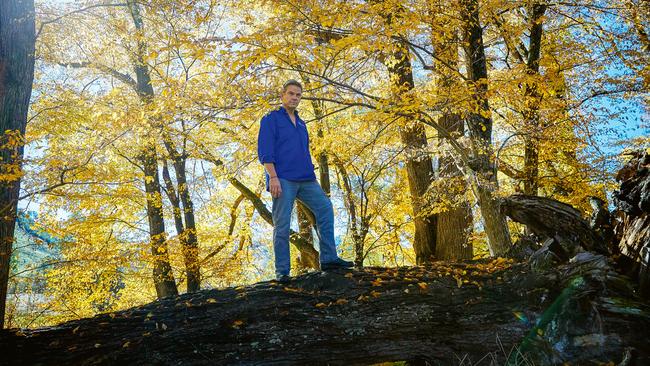
Asked about both the actions and threats by Facebook not to renew content deals with Australian media companies and remove news from its platforms, Murdoch said: “It’s very troubling. It shows the arrogance of the Big Tech platforms, the monolithic type of power they have, how entrenched they are that they feel they can disrespect their users by taking away trusted news information. It’s important that governments and regulators understand what a critical stage we have reached in the future of journalism.”
The executive chairman of News Corp Australasia, Michael Miller, in a recent speech to the National Press Club, said tech giants should be required to sign up to “social licence” laws where they accepted responsibility for content amplified, curated and controlled by them, with provisions to protect consumers; and that they be bound to honour the media bargaining code that required payment for content.
News Corporation has moved fast on AI. It recently concluded an agreement with OpenAI to bring the company’s international news content (including The Australian) to OpenAI in a way that values reporting and journalism with the potential for a longer-run partnership.
“We are at the very early stages of AI,” Murdoch said. “You’ll see companies use it to take the costs out. But AI is very good at taking big data sets and using that to formulate results. We will be a core part of it – obviously, we’re going to protect the IP holders, both us, our journalists and authors.”
Asked what he learnt most from his father, Lachlan shot back: “The value of curiosity. He is always questioning, always thinking, always learning.”
It’s a neat summary of The Australian’s character as a masthead that looks to the future.


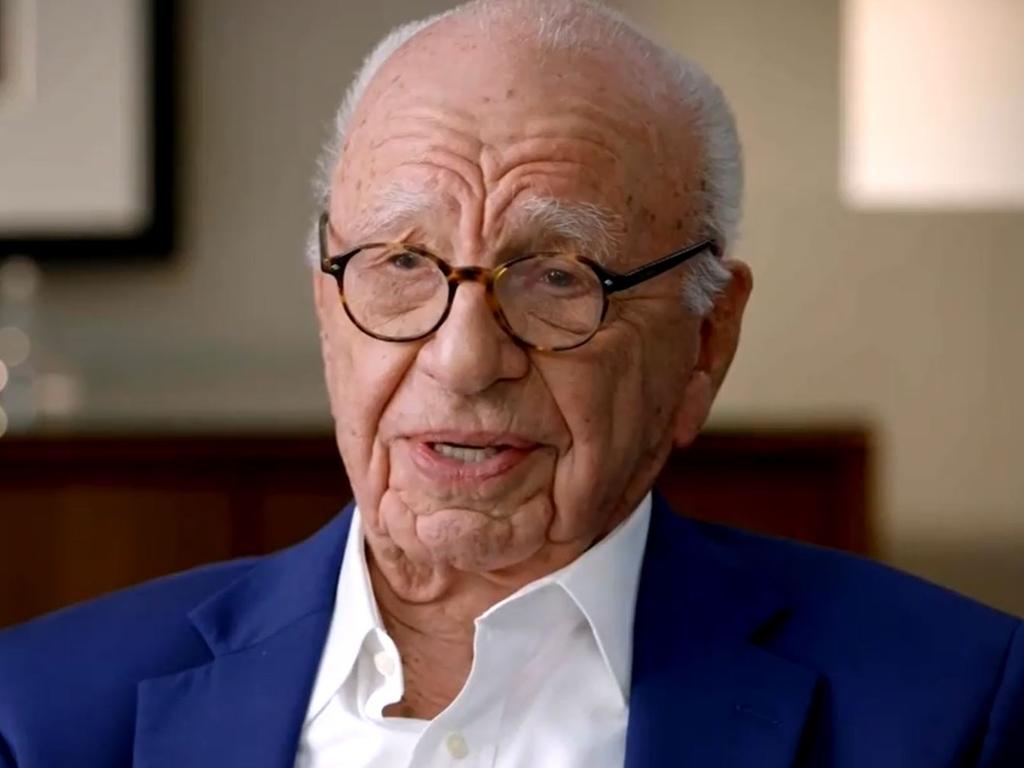

To join the conversation, please log in. Don't have an account? Register
Join the conversation, you are commenting as Logout